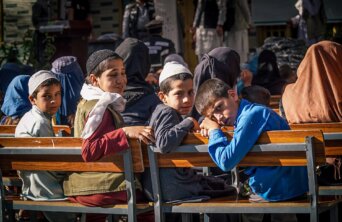- About
- Topics
- Story
- In-Depth
- Picks
- Opinion
- News
- Donate
- Signup for our newsletterOur Editors' Best Picks.Send
Read, Debate: Engage.
| topic: | Peace and Reconciliation |
|---|---|
| located: | Afghanistan |
| editor: | Shadi Khan Saif |
15 August stands eternally etched in history as the day when the nascent Republic of Afghanistan succumbed to a totalitarian militant group following a haphazard US withdrawal.
But this anniversary represents more than just a tragic date in Afghanistan's tumultuous past; it symbolises the collapse of democracy and the abandonment of a war-torn nation by the free world. Two years on, Afghanistan continues to grapple with the repercussions of that fateful fall, enduring a profound and ongoing humanitarian crisis.
It is crucial for citizens in the free world to engage with their respective governments and seek answers regarding the reasons behind Afghanistan's collapse. By raising their voices and demanding accountability, citizens can play a role in shaping policies and actions that aim to alleviate the suffering of those left vulnerable under Taliban rule.
To provide some context, let us take a look at what leading humanitarian organisations are reporting about the state of the nation's crumbling healthcare system, endemic hunger and gender-apartheid aimed at weakening the status of women and girls.
According to UNICEF, nearly 90 per cent of Afghanistan's population is teetering on the edge of poverty, with children being particularly vulnerable. The crisis has also had a severe impact on the media landscape in the country. Once a vibrant platform that held power accountable and amplified the voices of the marginalised, the media is now facing significant constraints. Reporters Without Borders stated that close to half of Afghanistan's independent media was wiped out within the first three months of the Taliban's takeover.
Since then, the situation in Afghanistan has continued to deteriorate, particularly for girls and women. The closure of schools and universities for girls persists, and there has been a further tightening of restrictions that aim to marginalise and exclude females from public life.
What lies at the core of this horrific state of affairs?
The poverty and hunger gripping Afghanistan can be attributed to multiple factors. The drastic decline in aid and investment, along with the sanctions on Afghanistan's banking system and frozen state reserves, has had a significant impact on the country's economy, exacerbating the humanitarian crisis.
Moreover, the erosion of fundamental rights and social liberties, especially for women and marginalised groups, is largely a result of the Taliban's oppressive policies.
Finally, the lack of meaningful engagement with the Taliban by the international community has hindered the prospects of finding a comprehensive and inclusive resolution to the crisis.
Remember, the US held a marathon round of talks with the Taliban to secure an exit when the militants were waging armed insurgencies against the Republic, but held no such conversations once the group took charge of the state.
Caught in the middle, humanitarian actors are struggling to maintain a lifeline for Afghanistan's most vulnerable. There have been growing calls to bring the militants to the negotiation table and urge them to guarantee the rights and liberties of the Afghan people, seeing as sanctions and abandonment are proving to be most ineffective.
These calls, however, are often conflated with the recognition of the Taliban regime, which explains nations' reluctance to engage in negotiations.
The easy way out for them, it seems, is to continue to ignore Afghanistan until the next anniversary of the fall of the Republic and its people rolls around.
Image: Wanman uthmaniyyah.
